
Historic reenactors accurately portray specific time periods by wearing authentic costumes and demonstrating period-appropriate activities, enhancing public education and engagement at museums, festivals, and heritage sites. They research historical events and customs in depth to ensure accurate representation and often collaborate with historians and event organizers. Skills in acting, historical knowledge, and public speaking are essential for creating immersive and educational experiences.
Historic reenactor roles likely suit individuals with strong physical endurance and an interest in history, as the job often involves wearing period costumes and performing outdoors for extended periods. People who enjoy interacting with the public and have good communication skills may find this role more suitable. Those who might struggle with physical demands or have limited enthusiasm for historical accuracy could find the position less fitting.
Qualification
A Historic reenactor must possess a deep knowledge of the specific time period, including clothing, customs, and language, to accurately portray historical figures or events. Strong research skills and attention to detail are essential for creating authentic costumes and settings that reflect the era. Excellent communication and performance abilities enable reenactors to engage audiences and provide educational experiences effectively.
Responsibility
Historic reenactors are responsible for accurately portraying individuals from specific time periods, requiring thorough research to ensure authenticity in costumes, language, and behavior. They engage audiences by demonstrating historical events, crafts, or daily activities, enhancing educational experiences at museums, festivals, and living history sites. Maintaining safety protocols and respecting cultural sensitivities are essential parts of their role to create an immersive and respectful representation of history.
Benefit
Historic reenactor jobs likely offer significant benefits such as immersive learning experiences and the opportunity to engage audiences in educational storytelling. Participants probably develop strong communication skills and a deeper understanding of historical events and cultures. There is a chance for networking within history and theatre communities, which may enhance career prospects in related fields.
Challenge
Historic reenactor jobs likely present numerous challenges, particularly in accurately portraying characters and events with authenticity. Mastering period-specific skills, costumes, and language may require significant dedication and continuous learning. The probability of facing unpredictable weather or physical demands during outdoor reenactments is also relatively high.
Career Advancement
Historic reenactor careers offer growth through specialization in specific eras or event types, enhancing expertise and marketability. Advancing in this field often involves taking leadership roles such as event coordinator, instructor, or museum curator. Continuous skill development in research, costume making, and public speaking boosts opportunities for higher-profile assignments and collaborations with educational institutions.
Key Terms
Living History
Historic reenactors specializing in Living History embody past eras by authentically portraying daily life, customs, and events to educate the public. They meticulously research period-specific clothing, tools, and dialects to create immersive experiences that bring history to life. These professionals often collaborate with museums, schools, and cultural sites to foster a deeper understanding of historical contexts through interactive demonstrations.
Period Costume
Historic reenactors specializing in period costumes meticulously research and recreate authentic garments from specific eras, ensuring historical accuracy in fabric, design, and accessories. Their expertise includes hand-sewing techniques, sourcing vintage materials, and matching attire to the social status and role depicted in the reenactment. Mastery of period costume enhances the educational value and immersive experience of historical events and living history museums.
Authenticity
Historic reenactors specialize in accurately portraying specific periods by meticulously researching and replicating clothing, tools, and behaviors to achieve authenticity. Their commitment to detail ensures that every aspect, from costume materials to speech patterns, aligns with historical records and artifacts. This dedication enhances educational experiences by immersing audiences in genuine representations of past events and cultures.
Primary Sources
Historic reenactors rely heavily on primary sources such as letters, diaries, official documents, and artifacts to accurately portray past events and characters. These firsthand materials provide authentic insights into clothing, language, and social customs of specific time periods. Expertise in analyzing and interpreting primary sources ensures reenactments are both educational and historically accurate.
Interpretive Presentation
Historic reenactor jobs center on interpretive presentation that brings history to life through accurate portrayal of historical figures and events. They engage audiences by combining authentic costumes, period-appropriate language, and storytelling to create immersive educational experiences. Mastery of historical research and dramatic skills enhances the authenticity and impact of these reenactments.
 kuljobs.com
kuljobs.com